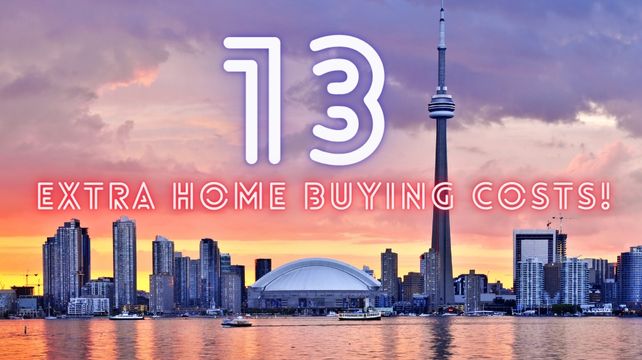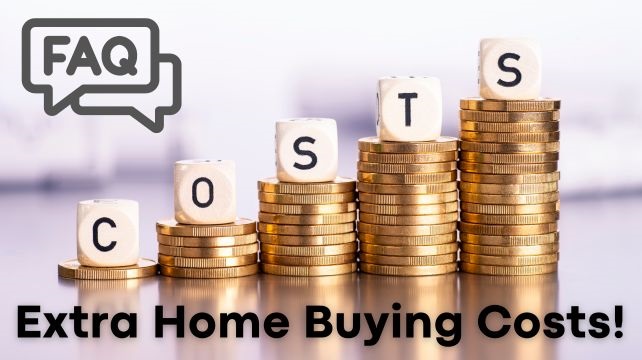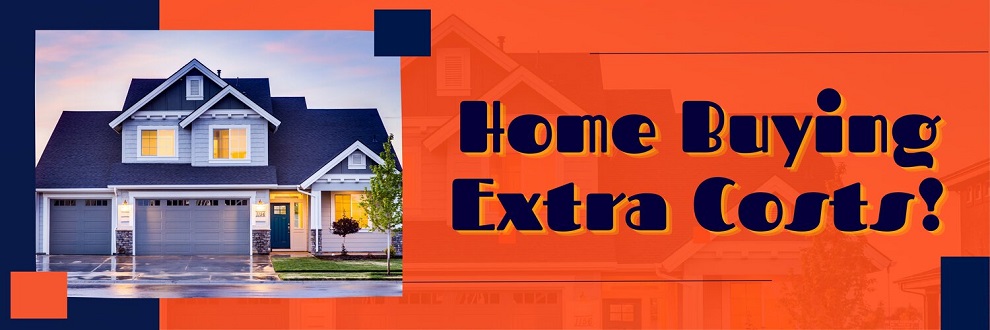The Fine Print of Home Buying: 13 Extra Costs You Need to Be Aware of Before Buying a Home in Toronto GTA! 

The Price Beyond the Price: Unraveling 13 Extra Costs Before Your Toronto Home Purchase!
Turn your Dream of Homeownership into Reality with our Comprehensive FREE Report!
Whether you're looking to Buy your first Toronto Home, or trading up to a larger one, there are many costs - on top of the purchase price - that you must figure into your calculation of affordability. These extra fees, such as taxes and other additional costs, could surprise you with an unwanted financial nightmare on closing day if you're not informed and prepared.
Some of these costs are one-time fixed payments, while others represent an ongoing monthly or yearly commitment. While not all of these costs will apply in every situation, it's better to know about them ahead of time so you can budget properly.
Remember, Buying a Home is a major milestone, and whether it's your first, second or tenth, there are many small but important details, not to mention stress and excitement, to deal with during the process. The last thing you need are unbudgeted financial obligations in the hours before you take possession of your new home.
To help homebuyers understand what these extra costs are, and in what situations they may apply, a free industry report has been prepared called "13 Extra Costs to Be Aware of Before Buying a Greater Toronto Home".
Order this FREE Report NOW to make sure you're budgeting properly for your next move.

What are the additional costs that Homebuyers need to be aware of beyond the Purchase Price in Toronto?
- Land Transfer Tax: In Toronto, homebuyers are subject to both provincial and municipal land transfer taxes. The amount of these taxes is based on the purchase price of the property. First-time homebuyers may be eligible for rebates on these taxes.
- Legal Fees: Hiring a real estate lawyer is essential to handle the legal aspects of your home purchase. Legal fees can include various services such as title searches, contract review, document preparation, and the overall closing process.
- Home Inspection: It is highly recommended to have a professional home inspection to assess the condition of the property before finalizing the purchase. The cost of a home inspection typically falls on the homebuyer.
- Appraisal Fee: If you are obtaining a mortgage, the lender may require an appraisal to determine the market value of the property. The appraisal fee is typically paid by the homebuyer and can vary depending on the property's complexity and size.
- Mortgage Insurance: If your down payment is less than 20% of the purchase price, you may be required to obtain mortgage insurance. This insurance protects the lender in case of default and is an additional cost that is typically rolled into your mortgage payments.
- Property Insurance: Homeowners are required to have property insurance to protect against potential damages and liabilities. The cost of insurance can vary depending on factors such as the property's location, size, and value.
- Title Insurance: Title insurance provides protection against any issues or defects with the property's title. It is typically a one-time payment and provides coverage for the duration of your ownership.
- Moving Costs: Moving to a new home involves expenses such as hiring professional movers, renting a moving truck, or purchasing packing supplies. These costs should be considered when budgeting for your home purchase.
- Utility Hook-Up Fees: When moving into a new property, there may be costs associated with hooking up utilities such as electricity, gas, water, internet, and cable. These fees can vary depending on the service providers and the property's location.

How can I estimate the Closing Costs associated with Buying a Home in Toronto?
- Land Transfer Tax: In Toronto, homebuyers are subject to both provincial and municipal land transfer taxes. The amount of these taxes is based on the purchase price of the property. You can use online calculators or consult with a real estate professional to estimate the approximate amount.
- Legal Fees: Hiring a real estate lawyer is essential to handle the legal aspects of your home purchase. Legal fees can vary depending on the complexity of the transaction, but they typically range from $1,500 to $3,000 or more. It's recommended to get quotes from different lawyers to compare prices.
- Home Inspection: While a home inspection is not mandatory, it's highly recommended to assess the condition of the property. Home inspection fees can range from $400 to $800 or more, depending on the size and complexity of the property.
- Appraisal Fee: If you are obtaining a mortgage, the lender may require an appraisal to determine the market value of the property. The cost of an appraisal typically ranges from $500 to $800.
- Mortgage Insurance: If your down payment is less than 20% of the purchase price, you may be required to obtain mortgage insurance. The cost of mortgage insurance depends on the size of your down payment and the mortgage amount. You can consult with a mortgage professional to estimate the exact amount.
- Title Insurance: Title insurance provides protection against any issues or defects with the property's title. The cost of title insurance can range from a few hundred dollars to over a thousand dollars, depending on the property's value.
- Property Tax Adjustment: If the seller has prepaid property taxes, you may need to reimburse them for the portion of the taxes that apply to the period after the closing date. This adjustment is made during the closing process.
- Moving Costs: Moving to a new home involves expenses such as hiring professional movers, renting a moving truck, or purchasing packing supplies. The cost of moving can vary depending on factors such as distance, volume of belongings, and additional services required.

Are there any specific taxes or fees that I should factor into my budget when Purchasing a Home in Toronto?
- Land Transfer Tax: Toronto has its own municipal land transfer tax in addition to the provincial land transfer tax. The amount of the tax is based on the purchase price of the property. The rates vary depending on the value of the property, and there are different tax brackets. You can use online calculators or consult with a real estate professional to estimate the land transfer tax payable on your purchase.
- Property Taxes: Property taxes are an ongoing expense that you will have to pay as a homeowner in Toronto. The amount is based on the assessed value of the property and is determined by the municipality. You can contact the City of Toronto's tax department or consult with your real estate agent to get an estimate of the property taxes for the specific property you are interested in.
- Development Charges: In some cases, when purchasing a newly built home or a property in a newly developed area, you may be responsible for paying development charges. These charges are levied by the municipality to fund infrastructure projects and services. The amount of development charges varies depending on the location and type of property. It's important to inquire with the builder or developer about any applicable development charges.
- Homeowners Association Fees: If you are purchasing a property in a condominium or a planned community, there may be homeowners association fees or condo fees. These fees cover maintenance, amenities, and shared expenses of the community. The amount of the fees can vary depending on the property and the services provided. It's important to review the condo or homeowners association documents to understand the fees and what they cover.
- Legal Fees: Hiring a real estate lawyer is essential to handle the legal aspects of your home purchase. Legal fees can vary depending on the complexity of the transaction, the lawyer's experience, and the services provided. It's recommended to obtain quotes from different lawyers to compare prices.
- Mortgage Fees: If you are obtaining a mortgage, there may be certain fees associated with the mortgage process. These can include appraisal fees, mortgage application fees, mortgage insurance premiums (if applicable), and other administrative fees charged by the lender. It's important to review the terms and conditions of your mortgage agreement and consult with a mortgage professional to understand the specific fees involved.

Are there any ongoing Maintenance or Repair costs that Homeowners should anticipate in Toronto?
- General Maintenance: Regular maintenance tasks such as cleaning, painting, and landscaping should be budgeted for on an ongoing basis. This includes tasks like cleaning gutters, servicing HVAC systems, maintaining the lawn and garden, and general upkeep of the property.
- Home Insurance: Homeowners insurance is essential to protect your investment. The cost of insurance can vary depending on factors such as the size of your home, location, and coverage options. It's important to shop around for insurance quotes and choose a policy that suits your needs.
- Utilities: Monthly utility bills for electricity, water, gas, and other services should be factored into your budget. The cost of utilities can vary based on the size of your home, energy efficiency, and usage habits.
- Repairs: Over time, various components of your home may require repairs or replacements. This can include plumbing repairs, electrical work, roof repairs, appliance replacements, and more. It's wise to set aside a contingency fund for unexpected repairs that may arise.
- Property Taxes: Property taxes are an ongoing expense that homeowners must pay. The amount is determined by the assessed value of the property and can fluctuate over time. It's important to budget for property taxes and be aware of any potential increases.
- Homeowners Association Fees: If you live in a condominium or a planned community with shared amenities, you may have to pay monthly or annual homeowners association fees. These fees contribute to the maintenance and management of common areas and services.
- Home Improvements: If you plan to make upgrades or renovations to your home, you should budget for these costs separately. Home improvements can range from small cosmetic changes to major renovations and can have varying price tags.

Are there any hidden or unexpected costs that First-Time Homebuyers often overlook in Toronto?
- Closing Costs: Closing costs are expenses incurred in addition to the purchase price of the home. They include items such as land transfer taxes, legal fees, title insurance, appraisal fees, and home inspection fees. These costs can add up and are typically paid at the time of closing.
- Moving Expenses: Moving from a rental property to a new home involves costs such as hiring a moving company, renting a moving truck, or purchasing packing supplies. These expenses can vary depending on the distance of the move, the amount of belongings, and the services required.
- Homeowners Insurance: While not necessarily hidden, homeowners insurance is sometimes overlooked or underestimated by first-time homebuyers. It's important to obtain adequate insurance coverage to protect your investment and belongings.
- Property Tax Adjustments: If you're buying a home from someone who has already paid property taxes for the year, you may need to reimburse them for the portion of the year that you will own the property. This adjustment is often made at closing and can be an unexpected expense.
- Maintenance and Repairs: As mentioned earlier, ongoing maintenance and repairs are costs that homeowners should be prepared for. However, first-time homebuyers may underestimate the expenses involved in keeping their new home in good condition.
- Condo or Homeowners Association Fees: If you're purchasing a condo or a property in a planned community, there may be monthly or annual association fees. These fees contribute to the maintenance of common areas and services and should be factored into your budget.

Can you provide examples of unexpected or hidden costs that Homebuyers might encounter during the Closing Process in Toronto?
- Land Transfer Tax: In Toronto, both the provincial and municipal governments impose land transfer taxes on the purchase of property. The amount you'll pay depends on the purchase price of the property. This can be a significant cost that some homebuyers may overlook or underestimate.
- Title Insurance: While title insurance is not mandatory in Ontario, it is highly recommended. It protects you against issues that may arise with the property's title, such as undisclosed liens, encroachments, or errors in the property's legal description. The cost of title insurance can vary but is typically a few hundred dollars.
- Legal Fees and Disbursements: Hiring a real estate lawyer is crucial for the closing process. They will handle various legal aspects, including reviewing the purchase agreement, conducting title searches, preparing documents, and facilitating the transfer of funds. Legal fees and disbursements can range from a few thousand dollars to more, depending on the complexity of the transaction.
- Home Inspection: While a home inspection is not a mandatory cost, it is highly recommended. A professional home inspector will assess the condition of the property and identify any potential issues. The cost of a home inspection typically ranges from a few hundred to a few thousand dollars, depending on the size and complexity of the property.
- Mortgage Default Insurance: If you're making a down payment of less than 20% of the purchase price, you'll likely need to obtain mortgage default insurance, also known as CMHC insurance. This insurance protects the lender in case you default on your mortgage payments. The cost of mortgage default insurance can vary depending on the loan-to-value ratio and other factors.
- Adjustment Costs: Adjustments refer to expenses that need to be shared between the buyer and the seller, such as property taxes, utility bills, or prepaid expenses. These adjustments are typically made at closing, and you'll need to reimburse the seller for their portion of these costs.

- Question: What are some common extra costs associated with buying a home?
Answer: Common extra costs include closing costs, property taxes, home insurance, mortgage insurance, appraisal fees, and title insurance. - Question: How do closing costs impact the overall cost of buying a home?
Answer: Closing costs typically include fees for services such as title search, attorney fees, appraisal fees, and loan origination fees. They can range from 2% to 5% of the purchase price and should be considered when budgeting for your home purchase. - Question: Are property taxes included in the extra costs of buying a home?
Answer: Yes, property taxes are an ongoing expense that homeowners must budget for. The amount will vary depending on the property's assessed value and the local tax rate. - Question: What is mortgage insurance, and is it an additional cost?
Answer: Mortgage insurance is required for homebuyers who put down less than 20% of the purchase price as a down payment. It protects the lender in case the borrower defaults on the loan. Mortgage insurance is an additional cost and can be paid monthly or as a lump sum. - Question: Are there any fees associated with obtaining a mortgage?
Answer: Yes, there may be fees associated with obtaining a mortgage, such as application fees, loan origination fees, and appraisal fees. It's important to discuss these fees with your lender and understand the total cost of obtaining a mortgage. - Question: Are home inspections an additional cost that buyers should be aware of?
Answer: Yes, a home inspection is an important step in the home buying process and typically comes at an additional cost. It helps identify any potential issues or repairs needed in the property. - Question: Are there any legal fees or expenses involved in the home buying process?
Answer: Yes, there are legal fees and expenses involved in the home buying process. These may include attorney fees for reviewing contracts and conducting the closing, as well as fees for title search and title insurance. - Question: Are there ongoing maintenance costs that homeowners should consider?
Answer: Yes, homeowners should budget for ongoing maintenance costs such as routine repairs, landscaping, and general upkeep of the property. It's important to factor these costs into your monthly expenses. - Question: Are there any potential renovation or remodeling costs to be aware of when buying a home?
Answer: Depending on your needs and preferences, there may be renovation or remodeling costs to consider when buying a home. These costs can vary greatly depending on the extent of the renovations and upgrades you wish to make. - Question: How do utility costs factor into the overall expenses of homeownership?
Answer: Utility costs, such as electricity, water, gas, and internet, are ongoing expenses that homeowners need to consider. The amount will depend on factors such as the size of the property, energy efficiency, and personal usage habits.
Act Now: "13 Extra Costs to Be Aware of Before Buying a Greater Toronto Home".
 Order this FREE Report NOW to make sure you're budgeting properly for your next move!
Order this FREE Report NOW to make sure you're budgeting properly for your next move!

